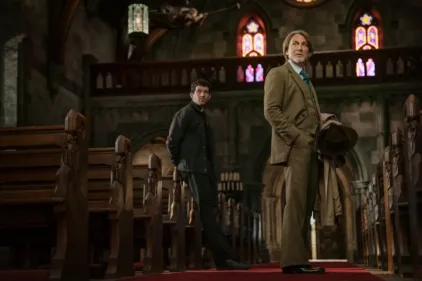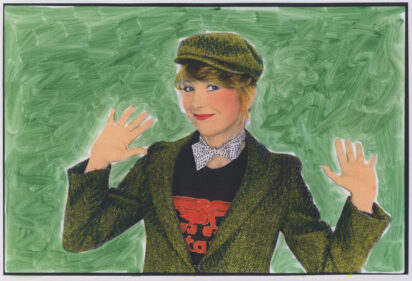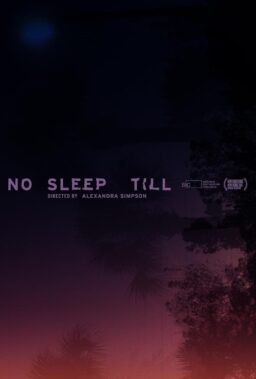Lew Grade, a titan of the British entertainment industry, died Sunday in London at age 91. For many years, he was a colorful fixture at the Cannes Film Festival, where after the box office failure of his film “Raise the Titanic!” he held a press conference to announce, “It would have been less costly to lower the ocean.”
This is a memory from the early ’80s, when Grade’s path crossed that of Billy Baxter, another Cannes legend, famed for calling all waiters “Irving.” It is reprinted from my book Two Weeks in the Midday Sun (Andrews-McMeel, 1987).
* * * *
I still do not fully understand how Billy Baxter convinced Lord Lew Grade, then the millionaire boss of England’s largest film conglomerate, to take Billy and his friends on the inaugural cruise of his lordship’s yacht. But there are many things I do not understand about “Silver Dollar” Baxter, one of them being how a character from out of the pages of Damon Runyon could survive and even flourish in these pale days of ordinary people. Baxter got his nickname because for years he arrived at Cannes with 2,000 American silver dollars, which he bestowed as tips. “You think this is something?” he once explained. “You shoulda seen what I paid in air freight to get them over here. I gotta send them in advance, because you try to get through customs with 2,000 silver dollars, you’re gonna be explaining things for hours.” Billy’s genius was to boldly cut through bureaucracy with his own loud personality. In 1980, he pulled off his single greatest stunt by issuing his own credentials to the festival. This was in connection with a Cannes television special that he had convinced Lord Grade to underwrite. “These guys over here are all hung up on anything that looks official,” he said. Taking advantage of this situation, Billy had a New York job shop print up dozens of official-looking credentials for the “World International Television Network” (“I shoulda added `Global,’ ” he moaned). Billy had a genius for sweeping up people who had no idea who he was, and introducing them to others he wanted to meet. “Sir Lord!” he boomed one night to Grade, “meet Miss Boop-a-Doop-a-Dee from Venezuela.” Instead of recalling names, he often improvised them, along with identities, credits and national origin. Baxter settled down next to Grade, accepted the offer of one of the lord’s foot-long cigars, rubber-stamped the bill and fell into deep conversation. Whatever Baxter said to Lord Grade that night was sufficient, apparently, for the lord to agree that Baxter and his friends were the natural choices as guests for the inaugural cruise of his yacht. I went along on that cruise, and the memory of it is still a wonderment. Spare me the stories of the great con men of the past; I ate Lord Grade’s fresh strawberries and listened to his stories because Silver Dollar Baxter had worked his magic. The morning after whispering in his lordship’s ear and rubber-stamping his bar bill, Billy settled down in the Majestic Hotel bar to compose a personal note to the lord: “Dear Lord Lew, here is a list of the people you should invite to your yacht on Sunday. All good people. Signed, B.B.” He licked the envelope flap and sealed it. “Signed with the sign of the Double B. My personal voucher that his lordship is gonna enjoy their acquaintanceship.” The next morning, Billy was pacing up and down in front of the Majestic Hotel, scanning the boulevard for signs of Grade’s rented limousines. “Rex Reed said he doesn’t know if he could make it,” Baxter said. “He says he’s gotta interview Monica Vitti, for chrissakes. I told him he can interview her any year, but this is his lordship’s inaugural cruise.” “Do you mean the yacht hasn’t sailed before?” “Naw. It’s 20 years old – back when they made real yachts. I mean, Lord Lew bought it yesterday, so he hasn’t seen it yet.” We all piled in – the usual crew of film critics like Reed, Kathleen Carroll, Andrew Sarris, Molly Haskell, Alexander Walker and Richard Corliss, all ready for our audience with the man who had made “Voyage of the Damned” and “Jesus of Nazareth.” It was possible that not a single one of us had ever admired any film Grade had produced, with the exception of “The Muppet Movie.” The limos pulled up to the harbor, and there was Grade, pacing by his gangplank. He was wearing gray flannel trousers, a blue blazer and a Panama hat. In his hand was one of the $25 cigars he fancies from the vaults of Davidoff’s on Jermyn Street. “I was growing nervous,” Grade said. “I thought perhaps you hadn’t been able to find the yacht.” “You kidding?” Baxter asked. “A yacht this size, you could fire off a machinegun.” For an hour or two, we wandered the yacht while it sailed near the shore from Antibes to Cannes. Grade spoke of his latest project to Richard Corliss: ” `The Muppet Movie.’ I have the biggest stars. Charles Bronson and Miss Piggy.” Then it was time for luncheon. A table in the shade was spread with linen and covered with cold smoked salmon, rare roast beef, iced lobster tail, caviar, salade mesclun and fresh strawberry tarts. Far away across the blue waters of the Cote d’Azur, the hapless tenants of the Hotel du Cap shaded their eyes on the verandas of their thousand-dollar rooms and squinted enviously at Lord Lew, rocking at anchor. “I have been thinking,” Grade told us, “of writing my autobiography. My life has been filled with coincidences. When I began in London, for example, I had an office across from the Palladium. Now I own the Palladium.” “What an amazing coincidence,” Rex Reed said. “I began as a dancer,” Grade said. “I did a double act with my brother, Lord Delfont. I was a natural at the Charleston, but the others I had to finesse. It was called `eccentric dancing.’ Like this.” He stood up, clasped his hands above his head, and bumped to an imaginary rhythm. “We played Paris, Germany. . . . We were always broke. Those were the days. I remember I was in love with twins. Two lovely girls. Dancers. I couldn’t make up my mind between them.” He sighed at lost opportunities. Luncheon drew to a leisurely close, punctuated by tarts. I dozed off in the midday sun, and was awakened by a quickening tempo in Lord Grade’s voice. “Television – television!” he was saying. “What an impact. With one successful program, we reach 10 times as many people as with a hit movie. My most successful TV program was, of course, `Jesus of Nazareth,’ directed for me by Franco Zeffirelli. Do you know that a survey was taken of 6,525 people. Forty percent said they had learned the most about Jesus from my program. Twenty-one percent named the Bible. Thirty percent named the church.” “Let’s see,” Rex Reed said. “That still leaves nine percent undecided.” Lord Grade sighted sternly down his cigar at Reed. “The survey,” he said, “was taken before the reruns.”











